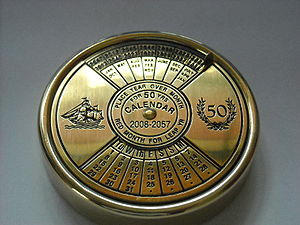 I love calendars. About as much as I love figuring out relationships.
I love calendars. About as much as I love figuring out relationships.
I guess they’re sort of the same thing.
When I was a kid I was obsessed with how people were related. I read all I could about our family tree, researching our genealogy as much as I could.
I was also obsessed with the relationships between numbers. Each one had a personality and a gender. I can’t explain them very well anymore, but I remember the feelings I had about them (and still do, to a large extent).
It may be a form of synesthesia. I don’t know; I’m not a doctor. All I know is I still have it in a lot of ways.

Like with the year, which I can explain better than numbers. January is male; February is female; March is male; April and May and June are all female; July is male; August is female; September and October are male; November is female; December is male. January is the CEO; at work all the time, hardly ever pays attention to February. February is gentle and soft-spoken, always shrinking herself down for the others. March is hot-headed and arrogant, always demanding more space. April is more concerned with her garden. May is motherly, though she’s not always warm. June is aunt-like — cool Aunt June, who takes the kids to the waterpark when mom needs a day off. July is the jock, always involved in some outdoors stuff. August is a tomboy, always chasing after July (and sometimes claiming victory over him). September is the scholar, nose buried in a book. October is avuncular — the type of uncle who chase kids around the house, dressed up in a monster mask. November is a snarky caustic bitch, mainly because she’s the black sheep of the family; she stalks the booze table at family gatherings. December is fatherly, but not a disciplinarian.
Perhaps my associations with the months are directly related to where I grew up (Lower Mainland, British Columbia) and its climate. I don’t know where they came from; to me they’re involuntary. Regardless, they show a set of relationships — specifically among the months of the year, which sort of seem like a family to me.
I still see calendars as sets of relationships, but I’ve expanded those thoughts — they’re now also sets of relationships between people and the world around them; between people and time itself. We put holidays where they make sense according to the world we live in; we give meaning to the days in order to relate to the world around us.
This is why I spend so much time creating calendars for the worlds I create in my fiction. It makes no logical sense to me for a people to not have some sort of calendrical system, some ordering of the days, and some designation of special days. They need to mark their relationship to time and the world around them somehow.
Calendars may be arbitrary. But if we don’t mark our relationship to time, it becomes one indistinguishable mass of day after day, placing us squarely in survival mode.
And that’s probably part of why I’m obsessed with them. I’m always trying to find ways to beat survival mode.
